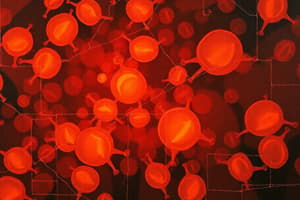Podcast
Questions and Answers
Which of the following is true regarding antigen presentation to activate effector functions of T cells?
Which of the following is true regarding antigen presentation to activate effector functions of T cells?
- Only humoral immune responses require antigen presentation to activate T cell effector functions
- T cells do not require antigens to activate effector functions
- Antigen presentation can be done by various kinds of APCs besides dendritic cells (correct)
- Only dendritic cells can present antigens to activate T cell effector functions
What is the function of MHC molecules in antigen presentation to T cells?
What is the function of MHC molecules in antigen presentation to T cells?
- To activate effector functions of T cells
- To display peptides derived from protein antigens (correct)
- To capture and present antigens to trigger immune responses
- To produce protein antigens
How does the antigen receptor of a T cell recognize a complex of peptide antigen displayed by an MHC molecule?
How does the antigen receptor of a T cell recognize a complex of peptide antigen displayed by an MHC molecule?
- By recognizing only some amino acid residues of the peptide and the MHC molecule (correct)
- By recognizing all amino acid residues of the peptide and the MHC molecule
- By recognizing only polymorphic residues of the MHC molecule
- By recognizing only anchor residues of the peptide
Which of the following is true about MHC restriction?
Which of the following is true about MHC restriction?
What is the role of antigen-presenting cells (APCs)?
What is the role of antigen-presenting cells (APCs)?
What is the significance of MHC restriction?
What is the significance of MHC restriction?
Flashcards are hidden until you start studying




